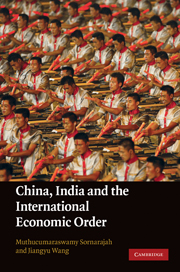Book contents
- Frontmatter
- Contents
- Notes on contributors
- Preface
- Introduction and overview
- PART I China, India and the global trade system
- PART II China, India and regional economic integration in Asia
- PART III Law and development in China and India: Domestic issues
- 14 Law and development in China and India
- 15 The development of modern corporate governance in China and India
- 16 An institutional race
- Index
- References
15 - The development of modern corporate governance in China and India
from PART III - Law and development in China and India: Domestic issues
Published online by Cambridge University Press: 03 May 2011
- Frontmatter
- Contents
- Notes on contributors
- Preface
- Introduction and overview
- PART I China, India and the global trade system
- PART II China, India and regional economic integration in Asia
- PART III Law and development in China and India: Domestic issues
- 14 Law and development in China and India
- 15 The development of modern corporate governance in China and India
- 16 An institutional race
- Index
- References
Summary
Introduction
Corporate governance reform has become a topic of considerable debate both in the US and in many emerging markets. Indeed, the discussion is important because these reforms may have potentially long-standing effects upon the global allocation of capital, and in understanding the ways in which governance norms are communicated across markets and nations in an ever-globalizing world. In this chapter we examine the corporate governance reform efforts of the world's two biggest and fastest growing emerging markets, the People's Republic of China (PRC or China) and India. In the process we find that our understanding of how and why corporate governance reform comes about, where it leads, and what value it has can vary significantly, but still shares some commonalities that are of considerable theoretical and practical importance.
The inquiry commenced in this chapter is inspired by certain key facts. First, China and India are growing at a remarkable and unprecedented pace and seem to have survived the 2008–9 Global Financial Crisis better than most other economies. Second, China and India are not Western countries, but have been heavily influenced by “globalized” Anglo-American notions of corporate law, corporate governance norms, and securities regulation. Third, China and India are presently two of the most popular destinations for foreign capital in the world – whether via foreign direct investment (FDI) in essentially private (or pre-public) transactions or public capital markets transactions.
- Type
- Chapter
- Information
- China, India and the International Economic Order , pp. 513 - 576Publisher: Cambridge University PressPrint publication year: 2010
References
- 1
- Cited by



